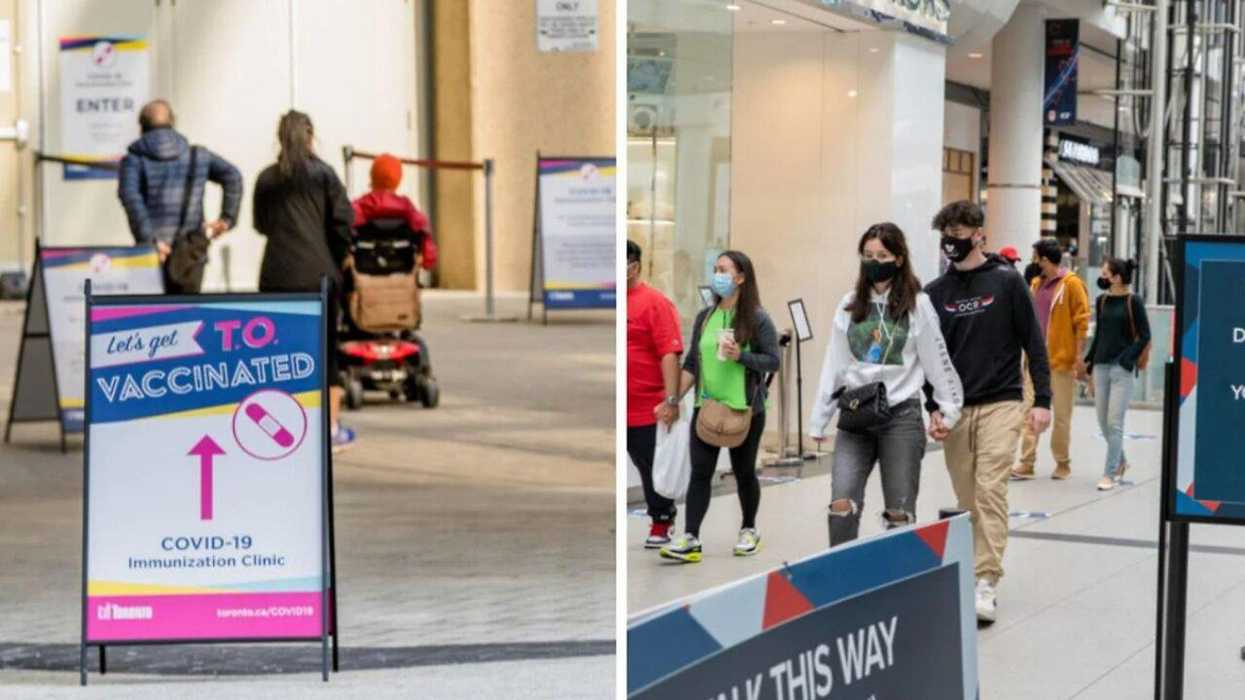Ontario's Top Docs Reveal What A Fourth Wave Will Look Like As COVID-19 Cases Slowly Rise
Unvaccinated people under 60 will be at a greater risk this fall.
Ontario's top doctors have started to discuss what a fourth wave of COVID-19 will look like this fall in the province.
During a press conference on August 10, Dr. Kieran Moore, Ontario's chief medical officer of health, confirmed that cases will most likely surge this fall and have already started to slowly climb.
Likewise, Dr. Karim Kurji, York Region medical officer of health, told Narcity that cases are not only rising in children but that he expects an overall rise in COVID-19 cases this fall as well.
Will COVID-19 Cases Rise This Fall?
Kurji and Moore both suspect COVID-19 cases will continue to rise this fall and attribute the increase to people spending more time indoors, travel restrictions loosening, influenza and respiratory illnesses weakening immune systems, and the weather.
"We're now having a slow and steady rise in cases absolutely expected for a virus that prefers low humidity and colder temperatures, and it will come back and as we head indoors and the temperatures go down and we're closer [to] faces, [in] closed ventilation systems, the virus will tend to want to take off," said Moore.
Kurji attributes the upcoming rise to travel restrictions loosening and respiratory infections weakening peoples resistance to COVID-19 as well as "an indoor clustering of people during the fall or winter and usually less ventilation if you might like to call it that."
"The other thing is, you have been seeing surges in many other countries and somehow it seems like we can't escape these surges for one reason or another. So that may be another reason why we can expect our numbers to keep increasing," Kurji continued.
Who Will Be Affected?
Moore suspects unvaccinated younger individuals under the age of 60 will face the brunt of the fourth wave surge, and Kurji agrees.
"Given the vast majority of our elderly individuals are protected, we anticipate that the admissions to hospitals and the burden of illness that will require hospitalization will be in younger age groups," said Moore.
"I'm calling on them, day in and day out, to come forward and get vaccinated because every single admission to hospital is preventable, every intubation and mechanical intubation to me is preventable going forward if we can achieve a high rate of immunization," said Moore.
Kurji says younger demographics, especially those under the age of 59, will be at greater risk thanks to projected data from an independent company called Scarsin.
"Most recently, they are projecting an increase in the cases, that these increasing cases will continue into the fall, and most of these cases will be in the under 59 age group, but mainly the younger age groups," said Kurji. "The worrying part is that if we don't get ahead of this curve, that is coming. We're bound to be in what some people are already describing, the beginning of the fourth wave."
Moore said that this trend of younger individuals needing more intensive care like hospitalization was already apparent in wave three.
"We saw that in wave three. Where it was a progressive increase in people under 60 that were actually requiring to come into hospitals to get extra oxygen and or to be ventilated, and that is the age group where we anticipate the fourth rise in cases, the fourth wave will affect."
How Can It Be Prevented?
Both doctors agree that immunization, along with other preventative factors, will play a big role in dampening the impact of a fourth wave.
"Now is the time to get immunized before we start seeing that rise in cases and that next rise or surge. It will be difficult to say when the absolute take-off will be of cases. I see a slow and steady rise in September and October as we move and socialize, and I do think that we will again be able to suppress influenza activity if we all continue to adhere to masking in Ontario," said Moore.
"That combination of masking, COVID immunization, influenza immunization could give our health system a chance to recover and get back to the great work they do day in and day out."
Kurji says since it takes about six weeks for an unvaccinated individual to become fully immunized, those who are hesitant should consult a health care professional about their concerns and "access these vaccines as soon as possible."
